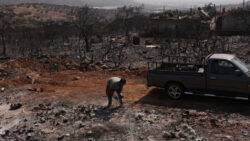Greece struggled to contain a wildfire west of Athens that burnt forestland for a fifth day on Friday as another heatwave hit the country.
Firefighters, backed by air water bombers and reinforcements by several countries, including Cyprus, France, Israel and Italy, attempted to control the fire that broke out in the wider Athens area on Monday, gutting houses and forcing evacuations.
More than 100 houses and businesses have been severely damaged from this wildfire and another near Athens that authorities put out earlier in the week.
The government on Friday announced relief measures for afflicted households, including financial aid and subsidies to rent houses.
Two other blazes in forests on the island of Rhodes and in the Lakonia district in southern Greece were tamed on Friday.
Climate Crisis Minister Vassilis Kikilias urged people to remain on guard. The risk of wildfires in the coming days will remain high and further heat is forecast following on from a previous heatwave.
“We are having a very difficult three-day spell, Friday, Saturday and Sunday, with extreme weather conditions and very high temperatures followed by strong winds,” the minister said, adding that after a short respite, another heatwave was forecast from the middle of next week.
With temperatures expected to hit 45 degrees Celsius (113 degrees Fahrenheit) on Saturday and Sunday, during the peak summer tourist season, the Culture Ministry said all archaeological sites, including the Acropolis monument, will shut between 12 noon and 5.30 p.m. (0900-1430 GMT) until July 23.
“The heat is a little too much, the heatwave is terrible,” said Italian tourist Michele Albano.
Greece recorded its deadliest and longest heatwave ever in July 1987, while extreme heat swept the country for 11 days in the summer of 2021, prompting devastating wildfires near Athens and on the island of Evia.
Meteorologists have warned that sweltering temperatures will last until the end of the month.
“It seems that the record of 1987 where temperatures were also very high for about 12-13 days will be broken this time” Antonis Lalos, a director at Greece’s National Meteorology Service told Greek radio on Friday.
Scientists have long warned that climate change, caused by greenhouse gas emissions mainly from burning fossil fuels, will make heat waves more frequent, severe and deadly. They have urged governments to drastically reduce emissions to prevent climate catastrophe.
(Reuters)





